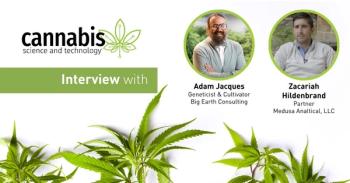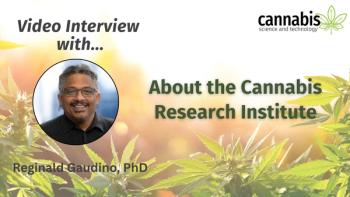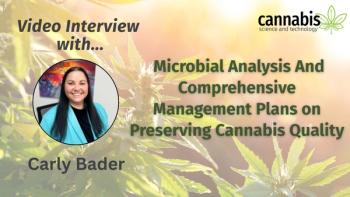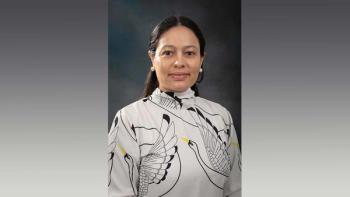
Cannabis Science and Technology
- Trailblazing Women in Analytical Science
- Pages: 12-15
Empowering Women in Cannabis: Susan Audino, PhD, on Inclusivity, Integrity, and Industry Challenges

Founder of S. A. Audino & Associates, LLC, Susan Audino, PhD, recently co-founded Saturn Scientific, LLC, a collaboration of five experienced individuals providing unbiased evaluations on the data and science for stakeholders in the cannabis industry. In this interview with Cannabis Science and Technology, Dr. Audino shares her unexpected path into analytical science and the cannabis industry as well as the obstacles she’s faced throughout her career. She highlights the gender bias she’s observed, such as unequal recognition of credentials and workplace challenges, while advocating for inclusivity and mentorship to empower women in science. Additionally, Dr. Audino recounts her experiences of navigating the male-dominated cannabis space, pushing for transparency, collaboration, and integrity in laboratory practices. Ultimately, Audino believes fostering mutual respect and knowledge-sharing is vital for the industry’s growth and resilience.
Can you tell us about your background in analytical chemistry and how you got involved in the cannabis industry?
Susan Audino: Chemistry is actually my second career. I had already gone through graduate school and was working in a different profession before I became interested in chemistry. Nobody is more surprised than me that I’m a chemist. But I ended up in chemistry and went to graduate school in chemistry, I did my research in mostly kinetics and thermodynamics, and then moved into analytical chemistry when I realized, “I’m really not going to get a job in thermodynamics and kinetics.” A few years later I happened to be visiting my family in Rhode Island and met up with an old family friend who was opening the state’s first dispensary and was unaware that I was a newly minted chemist. After a brief pause, he said, “I’m opening up this dispensary, and especially with your history, you’d be the perfect candidate to be my quality person and science person.” And I said, “Hey, don’t be crazy – that stuff needs to be illegal,” so he said, “All right, calm down and think about it.” So, I did, and I started reading research papers, a lot of the Raphael Mechoulam papers to understand the science. I did read a couple of the “toke up be happy” books, just to get an idea. It actually was a turning point for me because I became very interested in the science of cannabis. I thought then, as I do now, that is a fascinating material and subject matter.All that chemistry stuff going on is exciting for nerds like me.
At the time, I was working with an accreditation body and mentioned to a manager that I thought cannabis testing labs were on the horizon. They snickered and said, “Oh, Sue, probably not… They’re getting laboratories just to legitimize themselves.” About a year later they approached me with “Hey, Sue, can you tell us a little bit about cannabis?” And so, I did, and things have just sort of snowballed from there.
My previous career was in psychology. Combined with my education in physical and analytical chemistry, as well as my graduate fellowship in chemometrics, I’m a bit of a unicorn in cannabis.
That’s actually really interesting. You’ve done a lot. What challenges have you faced as a woman in the cannabis industry?
Audino: Ah, well, I’m sorry to say that gender bias remains alive and unfortunately well. Personally, I have worked with groups where they have referred to my male counterparts as “Dr. so and so,” and [to me as] “Miss Audino.”I’m really not an education snob, I don’t care about PhD versus not PhD, but if I’m being named alongside a male counterpart who has his credentials being recognized, then I get my hackles up if I’m not recognized as well because I worked just as hard as he did or they did. We’ve had a couple of people come back to me and say, “Oh, well, Sue, you’re just a PhD snob.” And, no, I’m really not. I do have “Dr. Audino” on my email signage, and that was a promise that I made to an undergraduate student, a young woman who later went to graduate school and said, “Please put ‘doctor’ on your email, because it helps us going forward.” And I did it even though it initially made me uncomfortable. I’m hoping that this helps to pave the way for younger women, more women in science.
So, I think that is part of it. I’ve been around gender bias for my whole career. I worked my way through college at an electronics store. If a male customer came in with a question about diodes or something, he would always go to the male sales reps and say, “explain to me these diodes.” And I thought, “I know more about those diodes than he does,” but you know, they “pacified the little girl.” When I first started in graduate school I attended a conference with about 500 people, of which there may have been four women. It was abundantly clear that there was still a gender bias. When I moved over into analytical chemistry, that bias seemed to shift dramatically where women were about 30% of attendees. It was interesting to see the shift in genders just based on different chemistry discipline.
As for the cannabis industry, it depends on where in cannabis industry we are. When we talk about the laboratory science part, I think there’s still a male bias with respect to science advisors and chief scientific officers.
As for me, I can only be myself and make contributions where I can – some stick, some don’t – and move on. It’s important for me to have opportunities such as this one, talking with you; [they] are important to me and those who follow. I’m on the tail end of my career but feel the responsibility to push or nudge younger scientists up. This helps men and women – and men’s acceptance of women.The goal is the same. How we reach that goal is a little bit different. Women need to be a little more assertive, and men need to be a little more humble. Women need to support themselves and men need to support women.
As a burgeoning industry, is the cannabis space a more inclusive/diverse environment compared to other industries?
Audino: I think it is a little bit more inclusive, but I don’t think that that’s the right question to be asking, because there are many elements converging that are making this an unsuccessful industry. Inclusivity, exclusivity – sounds like we’re talking micro – is a good question to ask, but I don’t think it is the best question about the status of the industry at the moment. There are simply too many contributions to the challenge.
How has a lack of gender diversity negatively impacted analytical chemistry and the cannabis industry?
Audino: One opportunity occurs when non-scientist laboratory owners start their business by listening to great blusterings of young male scientists who say things like “I’m really smart.” Then you have a more experienced woman walk in and say, “I think this person is in over his head,” but the lab owner’s response is, “Oh no, but we love him. He’s great. He’s smart.” Well, he may be smart but likely doesn’t have the expertise you need to have a successful laboratory … but the owners insist, “We still love him and are going to keep him.” Typically, months may pass until we get THE phone call: “We had to let him go.” Wrapping up the story – the insight of women, in my experience, is not always embraced by men. Conversely, I’ve had the pleasure of working with some amazing laboratory owners who say things like, “I know it’s unofficial, but I’m not making a decision without you,” so that warms my heart and makes me feel good.
I am told that women are viewed in one of two ways, either total bitchaholic and unapproachable, or too soft and they don’t know what they’re doing. The middle, which is where 99% of us function, generally goes unnoticed. But I think that’s beginning to shift a little, because women of the industry demonstrate we have a bit more stick-to-it-iveness than many of the guys before us. We’re just as smart, and in some ways a bit smarter, and we know how to understand problems that many traditional men don’t even know are problems yet. In my opinion, this shift is becoming more prominent. I know when I’m in a laboratory, I talk a lot. I talk about what appears to be inconsequential things like, “It’s kind of cloudy out there,” or “Where do you think that river goes?” But that’s really not my focus at all. My focus is, “How are you all handling this? And what else is going on the lab? And what are you going to tell me that you’re not going to tell me if I ask you directly?” So, I have to take a backdoor approach to get information that I need in order to do my job. That’s not always the case with men. Men can be straightforward to the point, and it’s recognized, and it’s admired. When women do that, we’re branded either too aggressive or don’t know what we’re talking about.
Considered bossy, more aggressive?
Audino: Oh yes, “aggression.” For those of us who challenge the science or the conclusions of other people we often do so to our own detriment with the loss of our own job, our own job security. And yet, those are risks we readily and knowingly take. “Do I remain silent and just go along the party line? Or should I just open my mouth and say what I think at the risk of offending people?” I never intentionally set out to offend people and I also take people at their word when they say, “Oh yes, we want feedback.” I have found that they “want feedback” until they actually get it.
It makes it a little more challenging to navigate the industry.
Audino: Yes, and this is already a challenging industry. The cannabis industry is quasi legal, quasi-illegal. It is sort of science driven, until it’s really not.
It is medicinal, until we have to be scientists, and then we want to be botanical specialists, and it’s all about the natural plant. So, the industry and those of us who work within it are in a wonky space.
From your perspective, how has gender inclusivity positively impacted the industry?
Audino: Well, it opens up more lines for effective communication, understanding, and knowledge. It’s all about learning and knowledge. If we begin to listen to one another, then we learn from one another. Men and women come in and say, “I’ve been doing this for five years. I’m really an expert in all things cannabis.” I find that offensive, and I find that it closes walls and closes doors, and eliminates the possibility for education and collaboration, which is one of the driving forces of people who want to effect change. For example Saturn Scientific is founded on collaboration.
Have you experienced any discrimination?
Audino: Not that anybody would admit to it. Long ago, I was in a job, and I was told that, “Hey, Sue, you’re the best chemist we have here, but you’re the least paid because you don’t have a family to support, and you’re the least paid because you were afforded the opportunity to have a US education, and you’re making everybody else look bad because you’re a good scientist, and other people don’t like looking bad.” All the while, I just tried to be the best chemist I could; not the best chemist. I really don’t care about others’ performance, only my own. Honestly, it was hard. So, when I came into the cannabis industry, I was pretty determined to maintain my position of transparency and scientific integrity and to also respect the other parties. It’s no secret that I challenge regulators. I challenge laboratories. It’s not a personal attack. I want to believe that everybody in the cannabis industry is doing so with the best of intentions with a desire to do the right thing for the right reason. It doesn’t always play out this well, however. And sadly, I think there are bad players, too.
My approach to my own work and our collective work in the cannabis industry is that we’re all learning something every day; we’re all teachers, and we’re all students all the time. As soon as someone comes in and says, “Hold the presses, I’m the smart one here, I’m the expert, you all have to listen to me,” then the opportunity for growth stops dead in its tracks. We have to be willing to work with one another, to talk with one another. It really is the only way that we can learn, and in my opinion, is the only way that this industry is going to survive.
What advice do you have for other female scientists looking to either enter or advance in the space?
Audino: I think that limiting oneself to the cannabis space is a professionally and personally a limit. Gaining experience as an analytical chemist an excellent opportunity to learn essential skills which can then be applied the cannabis industry. It seems that much of the cannabis industry is sort of incestuous. There seems to be a universal thinking mode of, “Oh, I’m experienced because I’ve only worked in a cannabis lab,” or “Well, your experience in the cannabis lab makes you a cannabis expert. Therefore, you should come work in my cannabis lab.” All the while, these scientists have lacked exposure to a lot of chemistry and their experience is limited to a cannabis bubble. So getting into the cannabis space for new scientists, young female scientist is fine, but to really excel, it is essential to first gain exposure to analytical chemistry outside of cannabis. This will benefit the industry.
About the Interviewee
Susan Audino is a chemist and independent consultant to chemical and biological laboratories. As a contractor for Accreditation Bodies, she assesses laboratories to and is an instructor for multiple ISO/IEC standards including ISO 17025. In addition to serving as science advisor to the AOAC International Cannabis Analytical Science Program (CASP), she was a contributing member of the NCIA Guide for Laboratory Testing, is a faculty member of Teachable Medicine, Board Member of Hood College, Board Member of The Center for Research on Environmental Medicine, board member of cannabis/hemp testing laboratories, and has been an invited speaker at many domestic and international scientific conferences. She has several patents pending, has authored book chapters and other peer reviewed papers. Most recently, Susan formed a unique consortium to be the voice of test data and reports.
Articles in this issue
Newsletter
Unlock the latest breakthroughs in cannabis science—subscribe now to get expert insights, research, and industry updates delivered to your inbox.



